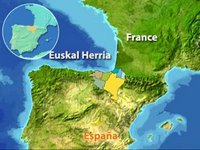It is also an article about how the recent ceasefire announced by ETA brouht the CBS to the front stage.
And let me tell you, if there is someone that can put ETA's truce into perspective, that is Gloria Totoricagüena.
Here you have as it appeared at Nevada News:
Small Basque studies program boasts global reach
4/10/2006
The Center for Basque Studies might be small, but this internationally recognized department is heralded for its research, student programs, scholarly conferences, and publications as well as considered a valuable resource by media and scholars worldwide.
After the Basque separatist group, ETA, recently announced a permanent ceasefire with the Spanish government, Gloria Totoricaguena, the center’s director, was tethered to her phone by interview requests from news agencies in the United States and abroad.
“There are just the few of us crammed into these sardine offices,” she said with a laugh. “But we network with people from Israel, Korea, China, all of South America and really all over the world, working on various issues.”
Totoricaguena took over as director of the center following Joseba Zulaika. During Zulaika’s two three-year terms, he and his staff advanced the international prestige of the center by creating a new curriculum in Basque studies and developing several new University publications that were recently presented at the annual Durango Book Fair, held in Durango, Spain.
Zulaika was interviewed by the local media and gave a lecture titled “Reno’s Basque Library, Memory of a People.” Various articles about Zulaika’s participation at the book fair and the Center’s books appeared in several newspapers, including Noticias de Gipuzcoa, Noticias de Alava, Gara, Deia, and El PaÍs. In addition, interviews with Zulaika were broadcast on Basque radio stations Euskadi Irratia and Bizkaia Irratia, as well on Basque television, Euskal Telebista.
“The Basque Country serves as a case study," Totoricaguena said. "Whatever is happening in the Basque world might also be indicative of what’s happening in other similar situations -- in migration studies, diaspora studies, much of anthropology, nationalism studies, political science studies, and even in the art world.”
The center will host an international conference on migration studies that is open to the public and includes the participation of professional representatives, scholars, and researchers from around the world from April 27-29.
The limited but dedicated faculty and staff have made the center the leader in Basque topics outside of the Basque country. The research the center accomplishes and the programs offered help to understand the general impact of societal development on minority cultures and regions.
“We’re talking about people who leave their homeland, go to another place but still maintain their language, their sense of nationality, maintain their cuisine, their music, their literature and their cinema,” Totoricaguena said. “We ask questions like, what is important about ethnicity, why do people maintain their identity, why is that more important to them than other life issues.”
Originally the center was created in cooperation with the Desert Research Institute before being housed at the University. Its founder, William A. Douglass, took the opportunity to create an internationally recognized research program from a generalized local study about Basque immigrants who had moved to the West during the gold rush.
“William Douglass is the reason the Center exists,” Totoricaguena said. “He had been to the Basque country and had already studied the Basques before establishing our program. He had great ideas and because of his quality research and international recognition, the center has become what it is today.”
Because of its relatively small size, the center is only able to offer a minor for undergraduates and an interdisciplinary doctoral program.
There are some real benefits to being small. With only five professors, the department often invites other professors from Basque universities to teach for a semester.
“This semester we’ve got a professor here to teach Basque cyber-culture,” Totoricaguena said. “So we’ve gone beyond studying anthropology and are doing research on how the Internet affects identity, ethnicity and Basque-ness and comparing that to the similar effects it has on other cultures.”
“The program gives students the opportunity to think about themselves compared to another ethnic group,” Totoricaguena said. “It encourages them to see past the linear -- my life, my job, my family -- and to think of themselves as part of a global society.”
Students and scholars come from around the world to study and participate in the Center’s workshops and conferences.
“We have had visitors that come to the University, hundreds if not thousands of people,” Totoricaguena said. “We have helped internationalize this campus, through the students that choose to study here and the researchers and scholars that visit us.”
The center continues to be primarily a research center that focuses on conducting and publishing Basque-related fields of interest, including anthropology, history, women’s studies, migration studies, cultural studies, literature, bibliography, and lexicography.

No comments:
Post a Comment